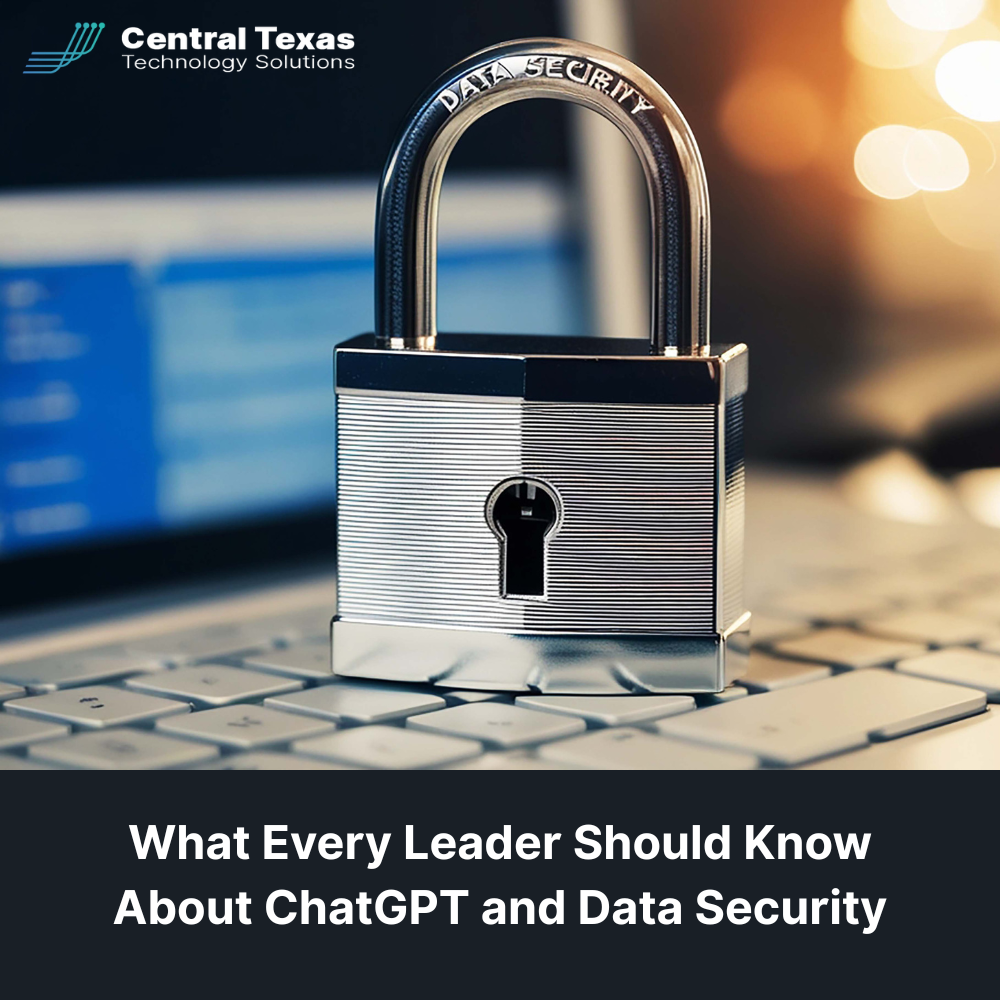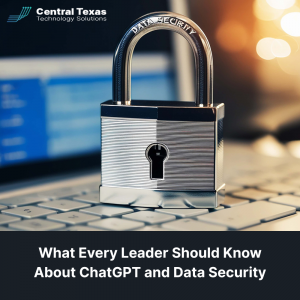
 Artificial intelligence has become a trusted helper in offices throughout Austin, Round Rock, and Georgetown. Tools like ChatGPT can write documents, organize research, help build marketing campaigns, and answer complex questions in seconds.
Artificial intelligence has become a trusted helper in offices throughout Austin, Round Rock, and Georgetown. Tools like ChatGPT can write documents, organize research, help build marketing campaigns, and answer complex questions in seconds.
They save time, spark new ideas, and make teams more productive. Yet many business leaders do not realize how quickly this same technology can expose sensitive information.
The biggest threat is not the tool itself. It is what employees unknowingly share with it. When staff upload internal documents or paste client information into AI tools, they create hidden risks that bypass traditional cybersecurity.
Leaders across Central Texas are seeing these concerns grow, especially in healthcare, legal, construction, professional services, manufacturing, and nonprofits. Protecting data now requires rethinking how employees use AI.
Understanding ChatGPT Cybersecurity Risks in the Workplace
Artificial intelligence has changed how organizations think about shadow IT. In the past, unauthorized tools looked like personal Dropbox folders, unknown file converters, or unapproved messaging apps. Today, GenAI platforms like ChatGPT are the newest version of the same problem.
Employees are using AI to draft proposals, summarize reports, or troubleshoot issues. According to research from LayerX, workers often share private information without realizing the consequences. This can include:
- Client contracts and legal documents
- Medical or personal information (PII and PHI)
- Payment card or financial data
- Internal presentations, strategy reports, and project plans
Once shared, the data leaves your control. Even if ChatGPT promises privacy protections, there is no guarantee that information will not be stored, reviewed, or used to train future AI models. Leaders must assume that anything uploaded to a public AI tool could be exposed.
Why ChatGPT Cybersecurity Risks Are Increasing
Employees rarely overshare with malicious intent. They are simply trying to do their jobs faster. ChatGPT makes it easy to cut corners in ways that were never possible before. Unfortunately, those shortcuts can create long-lasting consequences.
Oversharing with AI creates risks such as:
- Data leakage outside company networks
- Compliance violations in regulated industries
- HIPAA, PCI, SOX, or GDPR concerns
- Breaches of client trust that impact reputation
- Exposure of proprietary information that competitors could access
One of the biggest challenges is that AI tools make leaks harder to track. When information enters a private model, no log or record exists inside your network. Leaders cannot secure what they cannot see.
How to Reduce ChatGPT Cybersecurity Risks Inside Your Business
ChatGPT can still be a valuable workplace tool when used correctly. The goal is not to eliminate AI but to control how employees interact with it. Businesses across Central Texas can take practical steps to reduce risk and promote safe adoption.
To protect your business, focus on:
- Employee training
Help workers understand what information they should never upload to public AI tools. - Clear usage policies
Put rules in writing to define what employees can and cannot share with AI platforms. - Secure enterprise AI tools
Provide approved business-grade AI solutions with enhanced data controls. - Shadow IT monitoring
Use tools that detect unauthorized software or AI usage inside your network. - A culture of transparency
Encourage employees to ask before adopting new technology instead of experimenting on their own.
When leaders set boundaries and supply secure alternatives, employees work smarter without compromising the organization. Generative AI should amplify productivity, not endanger confidential information.
Why Central Texas Businesses Choose CTTS
Businesses need technology partners who understand both productivity and protection. CTTS helps organizations embrace AI safely, with security policies, monitoring tools, and leadership guidance that reduce risk. Our team works directly with executives in regulated and competitive industries to protect sensitive data before it leaves your network.
Your business can innovate confidently when you have cybersecurity experts watching over every step. CTTS equips your organization to use AI without exposing confidential information or violating compliance requirements.
FAQ About ChatGPT Cybersecurity Risks
Can ChatGPT store or learn from employee data?
Yes, most public AI tools store user inputs, even if they promise privacy protections. This data may train future models or be accessed by the platform provider.
Should employees ever upload confidential documents to ChatGPT?
No. Confidential, regulated, or sensitive documents should never be uploaded to public AI platforms. Only trained staff should use secure, enterprise-approved AI tools.
How does CTTS help secure AI usage in the workplace?
CTTS provides policy development, monitoring tools, employee training, and secure AI solutions designed for businesses in industries with strict compliance requirements.
Contact CTTS today for IT support and managed services in Austin, TX. Let us handle your IT so you can focus on growing your business. Visit CTTSonline.com or call us at (512) 388-5559 to get started!
